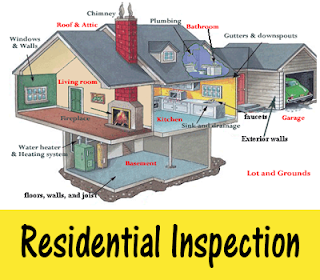

Inspection = Protection
I thought I would repost my blog about inspections and how they can protect a real estate buyer, since lately I've been sitting in on a lot of them. Any property you are considering to buy should be inspected before you proceed. Having an inspection contingency can provide negotiation leverage, prevent financial heartache and offer peace of mind. Although it may be tempting to buy something without an inspection, and may even help you win a bid over other offers that have included that contingency, choosing to have one is a guarantee you can opt to back out of the deal if there is something that can't be resolved pertaining to its results. So for your protection, get an inspection!

Sellers should be aware that they have a legal obligation to disclose all facts about a property including those found from a Buyer's Inspection report in a Seller's Disclosure/Transfer Disclosure Statement. An inspection contingency is usually written into a residential sales agreement and for commercial investing it's part of the due diligence performed. There are many kinds of inspections that can be performed including, but not limited to, a home inspection, radon, pests, sewer, water etc. The cost varies depending on what type of inspections you choose and yes, you as the buyer are traditionally responsible for covering the cost, but it is so well worth it. You will need to pick an inspector pretty quickly, once the offer is agreed to and signed, as there are time limits on performing various parts of a real estate transaction prior to it's closing. If you are using a Realtor, they can provide you with a list of ASHI certified inspectors, otherwise ask for referrals to ensure you feel comfortable that they are, above all else, thorough and impartial. Also check your state for education, certification and licensing requirements for inspectors as they can vary significantly. Ok, so you've picked someone you feel comfortable with and have scheduled them. Now what?

Always try to be present during the inspection as this is your opportunity to ask questions of the inspector along the way. The inspector will show you areas of concern now or items to be watched going forward, either to repair or for on-going maintenance. From a Seller's perspective, it may be nerve wracking to think someone is going to provide an opinion of issues with your property, but try to put yourself in the place of the Buyer wanting to be confident of a purchase. While a Buyer may decide to back away from the purchase, typically negotiations work out well for both sides.

A typical inspection can vary in time it takes to complete, anywhere from an hour to 2 for single family homes while multi-unit properties may extend much longer. An inspector will examine the property from the foundation to the roof and on the inside the electrical/gas systems, walls, flooring, plumbing, windows, doors, insulation etc. Again, there are various types of inspections you can opt for in addition like water, sewer, radon, etc. It can take a day to a few days to receive the inspection results. Once received it's very important that you go through them, preferably with a real estate professional, to fully understand what the items found on the report actually mean and how to move forward. Not everything is crucial, but health and safety issues should always be addressed. In my experience, I have more often seen a Buyer want everything on the report fixed before proceeding. But the reality is that the Sellers can choose to fix everything, fix some things or fix nothing. They can also agree to issue a credit or change the purchase price so that you, as the Buyer can fix certain items. So as a Buyer, pick and choose your battles carefully. Definitely I would suggest addressing the issues that are of a health and safety concern, followed by items that a Seller is likely to fix to keep the deal going. Here's where you really have to have strong negotiation skills or at the very least an advocate with strong negotiation skills. Many things can be worked on from the inspection results and put into a formal response.

Still, though, there are times when a mutual agreement cannot be reached and, if so, you as the Buyer can invoke the inspection contingency and back out of the deal. Your hand/deposit money may or may not be in jeopardy, but better that than buying a property with severe issues that would cost tens of thousands of dollars! Or even worse, not having an inspection contingency as part of the agreement that could result in a "money pit".

While many Buyers opt out of having an inspection and it may not be necessary with new construction, it's always a wise choice for your protection to have a property inspection!




Comments